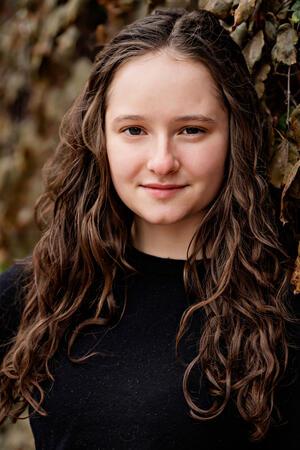Where Are They Now? RVF Alum Rose Clubok
As part of our ongoing series to mark the 10th anniversary of the Jewish Women’s Archive’s Rising Voices Fellowship (RVF), JWA talks to RVF alum Rose Clubok, who participated in the program’s eighth cohort. Rose just completed her sophomore year at Barnard College and the Jewish Theological Seminary (JTS).
JWA: Tell us what it was like participating in the Rising Voices Fellowship in 2020-2021.
Rose Clubok: RVF was an amazing experience for me and definitely shaped my future path in ways I couldn’t have predicted at the time. My year of RVF was entirely over Zoom due to the pandemic, and I was disappointed not to experience the [in-person] retreats. However, I think it was also the most impactful time for me to experience the fellowship. Rising Voices provided me with a community at a time when that was difficult to find. It was also one of the first times when I got to meet peers who had similar interests and questions about the world as I did.
JWA: What were the impacts of RVF on your high school self?
RC: RVF gave me the skills and confidence to publish my writing and a community of peers with whom to discuss and question the world. I remember sitting in the meetings and being awed by the knowledge, experience, and insight of my peers.
JWA: How has RVF continued to influence you as an adult?
RC: RVF influenced my life path even more than I expected. I learned about the Barnard/JTS double degree program through another member of my RVF cohort, and I decided to apply because of her. Once at Barnard and JTS, I found a community of RVF alumni who are some of my closest friends. RVF showed me how important it is for me to be surrounded by a Jewish feminist community. Beyond friends who also went through RVF, I'm so lucky to be part of such a vibrant Jewish feminist community in college. Mine and my roommate’s bookshelf is full of Jewish feminist classics like Standing Again at Sinai, The Red Tent, On Women and Judaism, and so many more books about Judaism, feminism, and Jewish feminism. I had no idea in high school that I'd be lucky enough to find this type of community, or even where to look for it.
JWA: You’re studying History, Urban Teaching, and Jewish Thought in college. How do you relate to these subjects as a Jewish feminist?
RC: I’m honored to have the opportunity to explore areas of study which previously haven't been open to Jewish women. It would've been unimaginable in previous generations that as a Jewish woman, I would have the opportunity to study Talmud and The Guide for the Perplexed with professors who are also Jewish women. In studying Intellectual History at Barnard, I find it incredibly valuable that I was exposed to and can draw upon the intellectual traditions of feminism and Judaism. In classes in such diverse subjects as the history of anarchism or the history of nationalism, the common point of analysis I constantly consider is how these strains of thought interact with and relate to Judaism and feminism.
JWA: You’ve worked as a Jewish educator and curriculum creator, and advocated on the JWA blog for Jewish instruction that's more diverse and complex. What would an ideal Jewish education look like to you?
RC: Since relationships to Judaism are shaped by a myriad of experiences and vary based on the individual, I wouldn't say that there is one ideal Jewish education. But I do believe there are Jewish educational methods or approaches that are ideal for certain contexts. In my work teaching third to sixth grade for Jewish supplementary school for five years, I published a curriculum which provides educators with tools to spark love for Judaism in an often challenging educational environment. The goal of the curriculum is to provide a foundation for future Jewish learning while connecting directly to students’ interests and experiences. I hope to use what I learn in my Education studies and Jewish Thought classes at Barnard and JTS to get closer to discovering what an ideal Jewish education could look like in other educational contexts.
JWA: What advice do you have for young people discovering their Jewish and feminist identities?
RC: The three things that have been most important for me in discovering my Jewish and feminist identities have been finding and building Jewish feminist communities, ritual practices, and learning opportunities. I don't see Judaism or feminism as fixed identities; I believe that continuing to learn is an important aspect of both. In addition to learning, a significant component of Judaism is ritual. Incorporating feminism into my Jewish practice has been a powerful part of finding a Judaism that feels meaningful and relevant to my life. Drawing out Jewish practices that can relate to feminism have helped me connect with the spirituality of Jewish ritual, from blessing the Imahot [matriarchs] in the Amidah to focusing on the meaning of the imagery of the Shechinah in the Kabbalat Shabbat service. Finding a Jewish feminist community has helped support the continuation of my learning and ritual exploration. I think it would be much more difficult to connect with these aspects of myself without peers and mentors who lend me books, lead services at egalitarian minyanim, and sing nigunim together for the Rosh Chodesh. I advise young people discovering their Jewish feminist identities to find communities that can support them in Jewish feminist learning and ritual.
This piece was written as part of JWA’s Rising Voices Fellowship.







